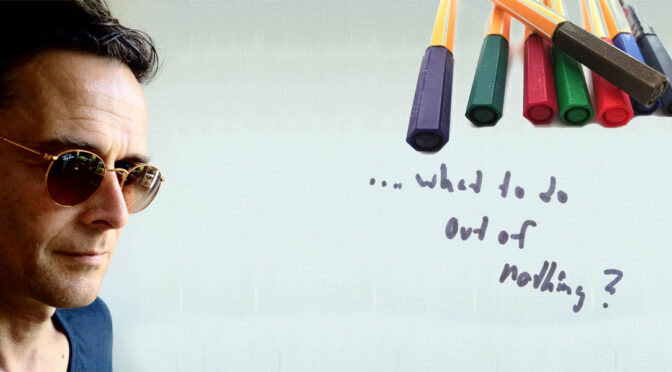A little boy once was playing with building blocks, trying to build up a tower. Pitily, the tower kept collapsing with every try, and the boy had to start from scratch, again and again.
His father was watching, and asked after a while „Hey young man, what are you trying to construct here – a tower?“
„No“, the boy replied, „I’m actually finding out, how I should not build a tower.“
***
Wise little boy. Today I am believing (after having meanwhile studied constructivism theory & German literature as a youg man) that we still don’t really know how to build something new, even as an „engineer“ – do we? To build something new is not a linear function, or something like a binary code – otherwise, it could be done by machines.

***
After having worked for seven years for German television play as author & duty editor, I became again curious about the idea of „not knowing“: I wanted to find out how to write a story without all necessary elements I had learned professionwise. It was like fighting against an inner demon who was telling me, I have to know how to make a film. There are rules that have to be followed and considered, when telling a story.
But I was obsessed to find out what happens to my film characters, if the main character is missing. Or what happens to a plot when it’s not taking place when one expects it. What, if the supporting characters don’t do or say anything for quite a while.
I wrote a script for several months. Good friends were wondering what took me so long when noone in that film should do or say anything. But it was such a hard fight to not do what I knew and have learned, but instead skip that and don’t know anything.
In 2002, I started filming my script, and therefore I had aqcuired several actors from the German Ernst Busch acting school, some renowned theatre actors from the „Berliner Ensemble“ Theatre (even one former student of Helene Weigel) and the director of another acting school (and former student of Jerzy Grotowski). I wanted to be absolutely sure that everyone watching the film takes it serious and that no one can say it’s simply some amateur trash – therefore, I invested quite a bit in recruiting (by time, not financially).
When the film was done one year later, it had a approximately running time of 42mins, which is neither a short movie nor a feature length – and simply doesn’t fit anywhere, easily. It was shown in Łódź, on a festival at that one film school Polanski was coming from. I didn’t go there, because I felt so ambivalent about it. In 2004, it was shown at a festival in East Village Cinemas in Manhattan, NY. For this time, I went there.
I was sitting in the cinema together with around 100 people watching – and felt like I was having four heart attacks during the screening. Even now while I am writing this down here, my heart remarkably speeds up remembering.
After the screening, when I left the cinema, a group of 15 to 20 people was standing in the entry hall, waiting for me. They didn’t look like they’re going to beat me up (which was my first thought), instead they were all wearing horn eyeglasses and actually looked like variations of Woody Allen. They surrounded me and spoke to me for a while, but I have no memories left today, what it was about. I was scared to death.
In Germany there was a kind of premiere in a cinema at Hackescher Markt, Berlin. I invited many collegues from film work and new collegues from my new tv job (meanwhile, I was working for a big tv broadcasting company as senior editor). I remember that I thought I might loose all my reputation as film maker, after letting them see this crazy piece.
In the end, they all were nice to me, whereby some said they didn’t like it and others liked it quite much. Strangely enough, all of my new broadcast collegues told me a few days later that they have had nightmares for several days, dreaming of this film.
***
So why do I tell you this story?
> I am trying to point out we all feel uncomfortable when skipping some rules or rituals that guarantee some safety to us. Or perhaps, that there can be a new way of expression when one’s ready to accept emptiness?
I’m telling this story as well, because I was editing this film with Paul. This is, how we as a team got to know each other. And from there, I’ve happened to meet Pedro later, in a project for Goethe Insitute, the lovley Kelvyn and (last but not least) Marcela. We finally built up a team with such loveable, exciting and fascinating characters. And we do have lots of stories to tell, whether in traditional or non-traditional ways…

